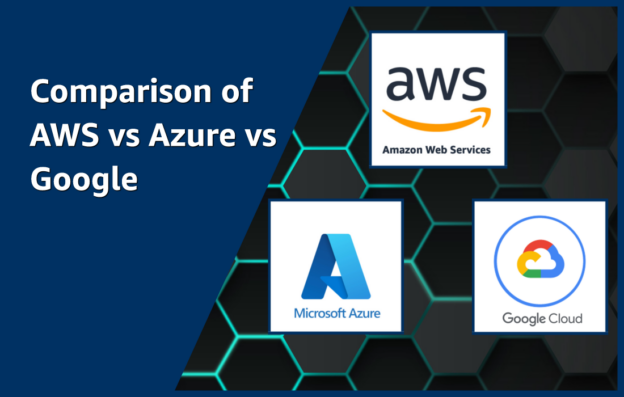As the world of data continues to grow exponentially, organizations are constantly looking for ways to store, manage, and analyze vast amounts of information efficiently.
One of the most popular solutions is leveraging cloud-based database systems like SQL. With major players like Azure, AWS, and Google Cloud offering cloud-based SQL services, it can be challenging to determine which one is the best fit for your organization.
In this article, we will dive deep into the features, advantages, and differences of Azure SQL Database, Amazon RDS, and Google Cloud SQL to help you make an informed decision.
Azure SQL Database
Microsoft’s Azure SQL Database is a fully managed, relational, and scalable cloud database service. It provides a wide range of capabilities and tools for businesses to build, deploy, and manage applications.
Key Features:
- Built-in intelligence: Azure SQL Database leverages advanced machine learning algorithms to automatically optimize your database’s performance, reducing the time and effort required for manual tuning.
- High availability: With a 99.99% availability SLA, you can rely on Azure SQL Database for consistent uptime.
- Security: Azure provides multi-layered security, including network isolation, data encryption, and threat detection.
- Scalability: Easily scale your database up or down with minimal downtime.
Example: A global e-commerce company can use Azure SQL Database to manage their inventory and customer data securely and efficiently, while ensuring optimal performance during peak sales periods.
Amazon RDS (AWS)
Amazon RDS (Relational Database Service) is a managed database service provided by AWS. It supports several database engines, including MySQL, PostgreSQL, Oracle, and SQL Server.
Key Features:
- Flexible pricing: Amazon RDS offers multiple pricing options, including on-demand and reserved instances.
- Backup and recovery: Automated backups and point-in-time recovery help protect your data from accidental loss or corruption.
- Monitoring and maintenance: AWS offers a variety of tools and services to monitor your database’s health and automatically perform maintenance tasks.
- Cross-region replication: Amazon RDS makes it easy to create read replicas across different regions, improving performance and redundancy.
Example: A fast-growing startup can use Amazon RDS to scale their database needs cost-effectively and efficiently while ensuring their data is backed up and secure.
Google Cloud SQL
Google Cloud SQL is a fully managed relational database service that supports MySQL, PostgreSQL, and SQL Server. It is designed to provide a scalable and reliable solution for managing and analyzing data.
Key Features:
- Performance: Google Cloud SQL leverages Google’s global network infrastructure to provide low-latency access and high-performance query execution.
- Security: Data is encrypted at rest and in transit, and Google Cloud SQL offers built-in tools for monitoring and alerting on potential security threats.
- Integration: Seamless integration with other Google Cloud services, such as BigQuery and Data Studio, makes it easy to build end-to-end data pipelines.
- Automated backups: Google Cloud SQL automatically backs up your data and allows you to create custom backup schedules.
Example: An analytics firm can leverage Google Cloud SQL’s high-performance query execution and seamless integration with BigQuery to analyze large datasets and generate valuable insights for their clients.
To make it easier to compare Azure SQL Database, Amazon RDS, and Google Cloud SQL, we’ve put together a comparison table highlighting the key features and differences between these cloud-based SQL services:
| Category | Azure SQL Database | Amazon RDS (AWS) | Google Cloud SQL |
| Database Engines | SQL Server | MySQL, PostgreSQL, Oracle, SQL Server | MySQL, PostgreSQL, SQL Server |
| Pricing | Pay-as-you-go, reserved capacity | On-demand, reserved instances | Pay-as-you-go, committed use discounts |
| Scalability | Vertical and horizontal scaling | Vertical scaling | Vertical scaling |
| High Availability | 99.99% SLA | Multi-AZ deployment, up to 99.95% SLA | Regional, up to 99.95% SLA |
| Backup & Recovery | Automated, point-in-time recovery | Automated, point-in-time recovery | Automated, custom backup schedules |
| Security | Data encryption, threat detection | Data encryption, network isolation | Data encryption, Google Cloud Armor |
| Monitoring | Azure Monitor, SQL Analytics | CloudWatch, RDS Performance Insights | Cloud Monitoring, Cloud Logging |
| Integration | Azure services, Power BI | AWS services, Amazon Quicksight | Google Cloud services, BigQuery, Data Studio |
Summary
When it comes to choosing a cloud-based SQL service, there are several factors to consider, such as performance, security, scalability, and pricing.
Azure SQL Database, Amazon RDS, and Google Cloud SQL all offer unique advantages that cater to different organizational needs.
By evaluating your specific requirements and comparing the features of each service, you can select the best solution to power your data-driven business. Happy database hunting!
Thank you for reading our blog, we hope you found the information provided helpful and informative. We invite you to follow and share this blog with your colleagues and friends if you found it useful.
Share your thoughts and ideas in the comments below. To get in touch with us, please send an email to dataspaceconsulting@gmail.com or contactus@dataspacein.com.
You can also visit our website – DataspaceAI







